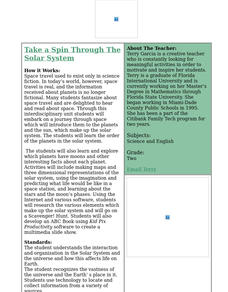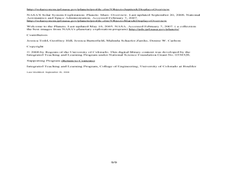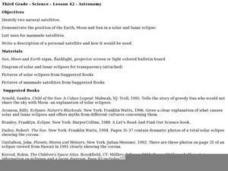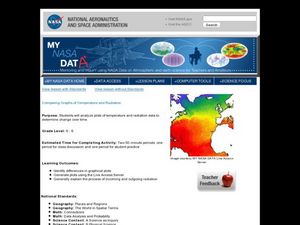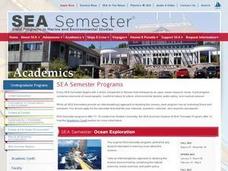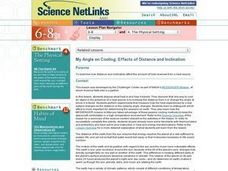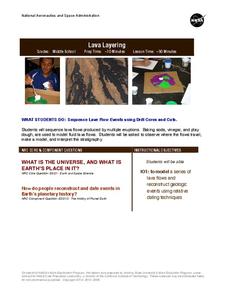Curated OER
Take a Spin Through the Solar System
Second graders participate in a variety of activities to explore the Solar System in this unit.
Curated OER
Atmospheric Shielding from Radiation III
In this radiation worksheet, students compare the efficiency of planetary atmospheres to shielding from radiation. This worksheet has 2 problems to solve.
Curated OER
Celestial Photography
Students practice photographic skills and gain an awareness of photography as a scientific tool.
Curated OER
Sunspots: Correlating Sunspots to Active Regions
Students investigate sunspots. They use solar imaging from satellite instruments which are currently circling the sun. Students compare images from the satellites and determine the existence of a correlation between the two types of...
Curated OER
Mars and Jupiter
Students learn about how engineers help us to know about Mars and Jupiter. In this Mars and Jupiter lesson, students are introduced to the telescope, deep space antennas, spacecraft, and planetary rovers that engineers designed to help...
Curated OER
Planet/Constellation Mobile
Pupils, through small group discussion, identify and share a rationale for shapes and patterns in the construction of a mobile that represents the solar system that makes them think of the creation of our solar system.
Curated OER
Science - Lesson 42 - Astronomy
Third graders demonstrate the position of the Earth, Moon, and Sun in a solar and lunar eclipse. They list uses for manmade satellites and write a description of how a satellite would be use.
Curated OER
Please Ex-Planet
Seventh graders create a model of an earth centered solar system and a model of the sun centered solar system. As a class, they discuss why the earlier astronomers believed their model and why it changed when evidence arose that this...
Curated OER
Jupiter - King of the Planets
In this Jupiter activity, students read a passage about the environment and atmosphere of Jupiter. Students then answer several multiple choice questions about the passage.
Curated OER
"Space" Investigations
Sixth graders understand the patterns of change observable on Earth as a result of the movement of the different bodies in the solar system. They identify the physical characteristics of the different components of the solar system.
Curated OER
Top 10 Aerospace Lesson Plans
You can use these exciting aerospace lesson plans to supplement nearly any unit in your science curriculum.
NASA
Collecting Electromagnetic Radiation
Astronomy is literally over your head, but this lesson will explain how we study it. Young scientists make telescopes, calculate and compare the light gathering power of lenses, and simulate detection of infared radiation....
Curated OER
Life on Mars
Young scholars research the feasibility of life on Mars and debate what it would need in order to sustain life. They work in teams to predict, research, infer, and explain their theory using models they build.
New Mexico State University
Lab 6: Kepler's Laws
A 15-page package thoroughly teaches your physics or astronomy learners about Kepler's three laws of planetary motion. Each one is stated and explained. Class members answer questions, solve problems, and participate in the classic...
Curated OER
Comparing Graphs of Temperature and Radiation
Students study plots and use a Live Access Server to generate plots. In this temperature lesson students examine the process of incoming and outgoing radiation.
Curated OER
Waters of the Earth
Students make a striking visual display showing the distribution of water on earth.
Curated OER
My Angle on Cooling: Effects of Distance and Inclination
Middle schoolers discuss what heat is and how it travels. They discover that one way to cool an object in the presence of a heat source is to increase the distance from it or change the angle at which it is faced.
NASA
Exploring Data
Bring the sun to your class! Young scholars analyze actual solar wind data in the second lesson of a five-part series. Their analysis includes speed, temperature, and density data.
NASA
Taking Apart the Light
Break down light into spectra. Scholars learn how atoms emit and absorb photons and come to understand how this process allows scientists to identify different atoms based on either absorption lines or emission lines. Learners then...
University of Washington
Kepler’s Laws
Introduce your physics or astronomy class to Kepler's laws of planetary motion with this straightforward worksheet. It covers the basic concepts of each and has learners answer questions to demonstrate their grasp on them. You could use...
Curated OER
Oh Deer!"
Learners explore the essential components of a habitat, which is food, water, and shelter. They end the lesson by paying the Oh Deer! game.
NASA
Lava Layering
Take the old baking soda and vinegar volcano to the next level by using it to study repeated lava flows over time, examine geologic features on Earth and Mars, and speculate about some of the formations on Mars.
PHET
Mapping the Field of a Dipole Magnet
High school scientists build their own magnetometer and use it to map the field surrounding a bar magnet. Excellent background resources is included, as well as a diagram of how to build the magnetometer.
University of Colorado
Are All Asteroids' Surfaces the Same Age?
There are more than 600,000 asteroids in our solar system. Pupils analyze images of two asteroids in order to determine if they are the same age. They count craters for each asteroid and compare numbers.
